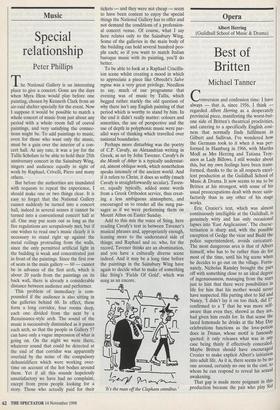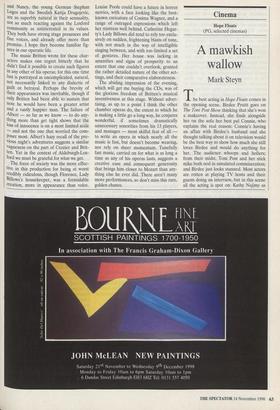Opera
Albert Herring
(Guildhall School of Music & Drama)
Best of Britten
Michael Tanner
Conversion and confession time: I have always — that is, since 1956, I think regarded Albert Herring as a desperately provincial piece, manifesting the worst-but- one side of Britten's theatrical proclivities, and catering to a specifically English cosi- ness that normally finds fulfilment in Gilbert and Sullivan. I've wondered how the Germans took to it when it was per- formed in Hamburg in 1966, with Martha Modl as Mrs Herring and Tatiana Troy- anos as Lady Billows. I still wonder about this, but my own feelings have been trans- formed, thanks to the in all respects excel- lent production at the Guildhall School of Music & Drama. It now seems to me to be Britten at his strongest, with some of his usual preoccupations dealt with more satis- factorily than in any other of his stage works.
Eric Crozier's text, which was almost continuously intelligible at the Guildhall, is genuinely witty and has only occasional lapses into 'East Anglicanism'. The charac- terisation is sharp and, with the possible exception of Gedge the vicar and Budd the police superintendent, avoids caricature. The most dangerous area is that of Albert himself, who has to be rather than do for most of the time, until his big scene when he decides to go out on the village. Fortu- nately, Nicholas Ransley brought the part off with something close to an ideal degree of ingenuousness, managing from the start just to hint that there were possibilities In life for him that his mother would never have suspected. His parting shot to Sid and Nancy, 'I didn't lay it on too thick, did I?' confirmed to a T that he was more self- aware than even they, shrewd as they are, had given him credit for. In that sense the laced lemonade he drinks at the May Day celebrations functions as the love-potion does in Tristan, whose motif is famously quoted: it only releases what was in any case being thinly if effectively concealed. Maybe Britten should have encouraged Crozier to make explicit Albert's initiation into adult life. As it is, there seems to be no one around, certainly no one in the cast, to whom he can respond to reveal his sexual awakening. That gap is made more poignant in this production because the pair who play Sid and Nancy, the young German Stephan Loges and the Swedish Katija Dragojevic, are so superbly natural in their sensuality, not so much reacting against the Loxford community as uninterested in its values. They both have strong stage presences and fine voices, and already offer more than promise. I hope they become familiar fig- ures in our operatic life.
The music Britten wrote for these char- acters makes one regret bitterly that he didn't find it possible to create such figures in any other of his operas; for this one time lust is portrayed as uncomplicated, natural, not necessarily linked to any dialectic of guilt or betrayal. Perhaps the brevity of their appearances was inevitable, though if only Britten had been able to sustain that note he would have been a greater artist and a vastly happier man. The failure of Albert — so far as we know — to do any- thing more than get tight shows that the loss of innocence is on a most limited scale and not the one that worried the com- poser most. Albert's hazy recall of the pre- vious night's adventures suggests a similar vagueness on the part of Crozier and Brit- ten. Yet in the context of Aldeburgh-Lox- ford we must be grateful for what we get.
The force of society was the more effec- tive in this production for being at worst credibly ridiculous, though Florence, Lady Billows's housekeeper, was a formidable creation, more in appearance than voice. Louise Poole could have a future in horror movies, with a face looking like the best- known caricature of Cosima Wagner, and a range of outraged expressions which left her mistress well behind. Catherine Hegar- ty's Lady Billows did tend to rely too exclu- sively on sudden, frightening blasts of tone, with not much in the way of intelligible singing between, and with too limited a set of gestures. Her house was lacking in amenities and signs of prosperity to an extent that one couldn't overlook, granted the rather detailed nature of the other set- tings, and their comparative elaborateness.
The abiding impression of the evening, which will get me buying the CDs, was of the glorious freedom of Britten's musical inventiveness at this stage. Without adver- tising, as up to a point I think the other chamber operas do, the extent to which he is making a little go a long way, he conjures wonderful, if sometimes dramatically unnecessary sonorities from his 13 players, and manages — most skilful feat of all to write an opera in which nearly all the music is fast, but doesn't become wearing, nor rely on sheer momentum. Tunefully fast music, carried on for what is as long a time as any of his operas lasts, suggests a creative ease and consequent generosity that brings him closer to Mozart than any- thing else he ever did. There aren't many more performances, so don't miss this rare, golden chance.



















































































 Previous page
Previous page